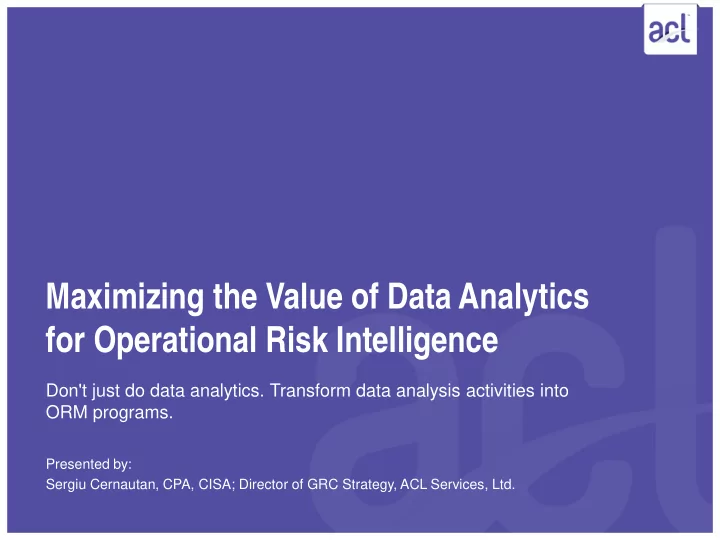

Maximizing the Value of Data Analytics for Operational Risk Intelligence Don't just do data analytics. Transform data analysis activities into ORM programs. Presented by: Sergiu Cernautan, CPA, CISA; Director of GRC Strategy, ACL Services, Ltd.
THE ORGANIZATION’S DATA CONTAINS THE KNOWLEDGE TO … Create Value Manage Operations Effectively & Efficiently Illuminate Risks & Opportunities
WHAT ARE THE TYPICAL VALUE CREATION OBJECTIVES? Creating value Value drivers Maximize revenue Control cost Manage capital Meet expectations Identify, analyze and Monitor and proactively Optimize capital Achieve sales targets develop new opportunities manage costs in an allocation Increase market within the market integrated and efficient Support buy / build / share manner. Prevent revenue loss leverage decisions Maintain efficient cost Value initiatives Achieve/maintain high Optimize product mix and Monitor effectiveness of structure levels of cost efficiency, prices capital utilization Achieve desired including shared Ensure timely revenue Optimize cash flow return on capital services collection Meet valuation Obstacles expectations Monitor performance metrics (KPI vs. KRI) Operational risks High priority Caused by people, processes, systems, external factors risks
WHAT STANDS IN THE WAY OF ACHIEVING VALUE OBJECTIVES? The risk of direct or indirect loss resulting from inadequate or failed internal processes, people and systems or from external events. - Basel Committee’s definition of Operational Risk Operational risk can result in loss of revenue, increased costs, poor return on capital, and failure to meet performance expectations. An effective ORM process enables organizations to identify, escalate, assess, prioritize, respond to, monitor and report risks that could impact achievement of value initiatives.
HOW IMPORTANT IS DATA TO PERFORMANCE IN OPERATIONS? Operations 88% Source: “Big Data: Lessons from the Leaders,” Economist Intelligence Unit Results from global survey of 752 executives and in-depth interviews with senior executives, March 2012
HOW CAN DATA ANALYTICS HELP? “… analytics is the process of obtaining an optimal or realistic decision based on existing data.” (Wikipedia) “Analytics leverage data in a particular functional process (or application) to enable context-specific insight that is actionable.” (Gartner, 'Analytics' buzzword needs careful definition, Andreas Bitterer ) “Data analytics is the science of examining raw data with the purpose of drawing conclusions about that information. Data analytics is used in many industries to allow companies and organization to make better business decisions ...” (www.whatis.com) 6
Illuminate Risks & Opportunities Manage Operations Effectively & Efficiently Create Value
CRITICAL ANALYTICS CAPABILITIES: WHAT ARE THE KEY QUESTIONS TO ANSWER? Insight Hindsight Foresight Action Source: Gartner, Neil Chandler, Agenda Overview for Analytics, Business Intelligence and Performance Management (February 2015) 8
Meet Maximize Expectations Revenue Hindsight Insight Foresight Action Manage Control Capital Costs 9
WHAT KIND OF DATA ARE COMPANIES EXPECTED TO ADDRESS? Combination of Traditional ERP Systems and Source Data People Source: PWC, Governance, risk and compliance convergence, March 2012
ACL FRAMEWORK FOR ACTION ORIENTED DATA ANALYTICS PROGRAMS Systems Import Data Scripts Connector Data Insight Raw Data Tables Common Transform Storyboards Visualization Data Models Scripts Analysis Analytics Surveys Triggers Tables Results Analysis Metrics Actions Scripts Action People Data
GETTING PRACTICAL Combining Value Creation with Analytical Capabilities
Meet Generate Expectations Revenue Hindsight Insight Foresight Action Manage Control Capital Costs 13
INSPIRATION HUB – A COLLECTION OF ANALYTIC USE CASES
SCRIPTHUB – A COLLECTION OF PRE-WRITTEN SCRIPTS
CONTROL COSTS: DISCRETIONARY SPENDING Answering the question: What happened?
DATA: Discretionary Spend Transactions
DATA ANALYSIS OBJECTIVE: Continuous Discretionary Expense Monitoring
RESULTS: Questionable Spend Transactions
CONTROL COSTS: DISCRETIONARY SPENDING Answering the question: Why did it happen?
GENERATING: Insights & Data Visualizations High risk department / user
GENERATING: Insights & Data Visualizations Unusual ‘approver’ activity
CONTROL COSTS: DISCRETIONARY SPENDING Answering the question: What will happen?
Linking results to operational risk
Strategic objective Operational risk
CONTROL COSTS: DISCRETIONARY SPENDING Answering the question: What should I do?
TRIGGERING: Actions Human Data Mining
TRIGGERING: Actions
TURNING ANALYTICS INTO ORM PROGRAMS Combining the 4 analytic capabilities
MAXIMIZING REVENUE: MONOTORING SALES KPI/KRI INDICES
APPENDIX: ANALYTICS RESOURCES FOR ORM PROGRAMS Further tools to help you
FURTHER RESOURCES TO SUPPORT YOUR DATA ANALYTICS Baystate Health Inc. case study (referenced in this APPENDIX) http://www.acl.com/pdfs/Case_Study_Baystate_Health.pdf Sample ACL data analysis use case library https://accounts.aclgrc.com/inspirations Sample ACL data analysis script template library http://www.acl.com/2015/02/12/what-is-acl-scripthub/ Sample data analysis use case applications by industry http://www.acl.com/pdfs/Applications_Education.pdf http://www.acl.com/pdfs/Applications_Retail.pdf http://www.acl.com/pdfs/Applications_Manufacturing.pdf http://www.acl.com/pdfs/Applications_Insurance.pdf http://www.acl.com/pdfs/Applications_Healthcare.pdf http://www.acl.com/pdfs/Applications_Government.pdf http://www.acl.com/pdfs/applications_general.pdf http://www.acl.com/pdfs/applications_Banking.pdf
ACTUAL EXAMPLE: Baystate Health Inc. - $2 Billion Healthcare Customer 2 Billing Systems … $ 2 .5 m illion in lost revenue recovered … Earnings Billing data Data performance import Connector Revenue Raw billing loss data Revenue Revenue loss loss by Normalize Revenue Billing patterns customer Cleansed data for assurance Integrity data comparison Billing line Maximize Investigate item item Billing team Compare revenue variances variances surveys data between Adjust Revenue systems Batch billings leakage control totals Billing data Billing Lost differences Reconciliation Revenue People Billing data integrity validation
ACTUAL EXAMPLE: Baystate Health Inc. - $2 Billion Healthcare Customer Procurement Systems … $ 1 8 .5 m illion in Earnings cost avoidance … Data P2P Import performance Connector Excessive Raw P2P spend Data High risk Duplicate Cleanup duplicate payments Supply chain Procurement P2P ADS vendors by vendor Script audit audit Potential Cleansed AP team Review Payment duplicate survey duplicates data processing payments accuracy Correct Vendor payment Duplicate vendor fuzzy match batch Total vendor payments payments Duplicate Duplicate invoice People invoices system checks Duplicate payment tests before disbursement
For more information please contact: Sergiu Cernautan Director, GRC Strategy sergiu_cernautan@acl.com
Recommend
More recommend